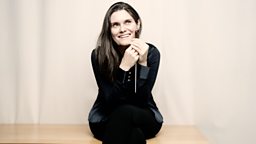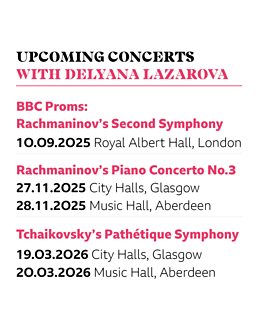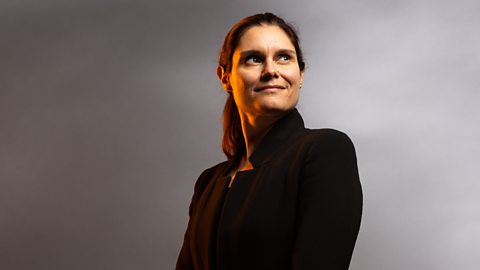Introducing... Delyana Lazarova

The ÃÛÑ¿´«Ã½ Scottish Symphony Orchestra's Principal Guest Conductor Designate has already captivated audiences at Glasgow City Halls.
As the orchestra prepares to celebrate its 90th anniversary season, Delyana Lazarova shares her musical passions, approach to programming, and current playlist favourites.
What were your earliest musical influences, and how did they shape your passion for orchestral music?
For as long as I can remember, I was surrounded by an interesting blend of classical music, Bulgarian folklore, and jazz—each shaping my musical world in its own way. Our home was filled with recordings of violinist David Oistrakh, pianist Vladimir Horowitz and cellist Mstislav Rostropovich, and I feel incredibly lucky to have grown up immersed in their sound, their phrasing, and their distinct artistry.
I’ve long been captivated—perhaps even obsessed—with the orchestral and chamber music masterpieces of Beethoven, Brahms, DvoÅ™ák, Tchaikovsky, Stravinsky and Bartók. Their music continues to inspire me. At the same time, Bulgarian folklore holds a deeply special place in my heart. Its complex rhythms, striking dissonances and the raw, haunting beauty of its vocal traditions have been a part of my life for as long as I can remember.
The works of Bulgarian composers like Vladigerov, Hristoskov, and Goleminov also left a profound mark on me. And in between all of that, we had treasured recordings of Duke Ellington and John Coltrane. Their music felt like pure freedom to me: spontaneous, fresh and full of the uninhibited expression that all great music needs.
What drew you to conducting and how did that journey unfold for you?
From an early age, I was fascinated by orchestral scores, drawn to the way composers translated their ideas onto the page. I loved unraveling their unique musical language—how each one used notation to shape sound and emotion. Even something as simple as an accent or a sforzato could mean entirely different things depending on the composer.
Conducting felt like a natural extension of my life as a violinist, a way to step deeper into the music and bring those markings to life.
"From the very first minute, the musicians welcomed my ideas with such openness and enthusiasm that it felt like coming home."
What did you most enjoy about your ÃÛÑ¿´«Ã½ Scottish Symphony Orchestra debut in 2024?
I’ve been reflecting a lot on that first rehearsal and our concert. It’s easy to say we had an instant connection, a special chemistry from the moment we started working together—but there was something more. I still can’t quite put it into words, but what struck me most was how deeply understood I felt musically. From the very first minute, the musicians welcomed my ideas with such openness and enthusiasm that it felt like coming home.

What do you particularly like about collaborating with the ÃÛÑ¿´«Ã½ SSO?
The ÃÛÑ¿´«Ã½ Scottish Symphony Orchestra is a wonderful organisation with a dedicated team that has upheld an exceptional standard of music-making across nine decades. What truly sets this orchestra apart is its remarkable versatility—a dream for any musician or conductor. Not only does it excel in the standard repertoire, but it also actively commissions and performs contemporary and lesser known works. That commitment is something I deeply value. It’s how music stays relevant, how it reflects the world we live in, and ultimately, how it paves the way for the future.
"What truly sets this orchestra apart is its remarkable versatility—a dream for any musician or conductor."
What inspires your programming?
I’m thrilled to bring audiences across Scotland programmes that are deeply personal to me—some beloved and familiar, some unjustly forgotten, and others written only yesterday.
My goal is to take listeners on a musical journey, weaving these lesser-known works into a meaningful context so they feel not just intriguing, but essential—pieces we’ll want to return to again and again.
Tell us about your first concert of the ÃÛÑ¿´«Ã½ SSO’s 90th season as Principal Guest Conductor.
Our concerts in Glasgow (27 Nov) and Aberdeen (28 Nov) bring together masterpieces by three distinctly different composers, each a master of orchestral colour. We begin with Rachmaninov’s Piano Concerto No.3—one of the great “Everests” of the piano repertoire featuring the fantastic Isata Kanneh-Mason.
After that, we’ll dive into Samuel Barber’s Medea’s Dance of Vengeance, a brilliant and perhaps lesser-known work, yet so vividly expressive that the story practically unfolds before your ears. We’ll close with Debussy’s La Mer—a breathtaking masterpiece of musical imagination and orchestral artistry.
If you could invite any conductor or composer to dinner, who would they be and why?
There are so many musicians I would have loved to meet, but if I had to choose, I’d start with Clara Schumann. I’d love to hear her thoughts on music, artistry and the world she navigated as a composer and pianist. In fact, I think she deserves a dinner all to herself.
Then, for a completely different evening, I’d bring together Stravinsky and Bernstein. Imagine the conversations and the stories… Now that would be a dinner to remember!
What tracks or artists do you listen to on repeat?
Right now, my top five are:
- The Berlin Philharmonic with Kirill Petrenko
- A Bossa Nova Classics playlist
- Four Cities by Fazıl Say with Nicolas Altstaedt
- Beethoven songs performed by Matthias Goerne and Jan Lisiecki
- And, of course, Stevie Wonder
Quite a mix, but each one brings something special.
If you weren’t a conductor, what do you think you’d be doing instead?
Either an astronaut—exploring the vast unknown—or something in the theatre, where storytelling and imagination come to life. Two very different worlds, but both full of adventure.


Delyana Lazarova appointed ÃÛÑ¿´«Ã½ SSO Principal Guest Conductor
Starting September 2025
